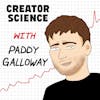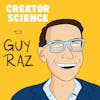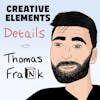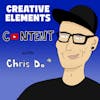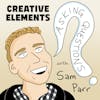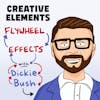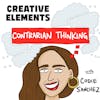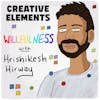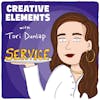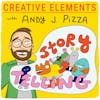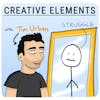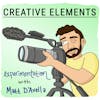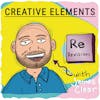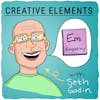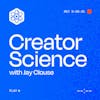
A conversation with the host of Entrepreneurs On Fire from HubSpot’s 2023 INBOUND Conference.
EPISODE DESCRIPTION
About a week ago, I was in Boston, Massachusetts for HubSpot's annual INBOUND conference. I was blown away by the scale of this event. I was lucky to be invited to come as one of HubSpot's creators to hang out in the Creator Cafe, host a meetup, and I also hosted a conversation on stage with John Lee Dumas, the founder and host of Entrepreneurs on Fire.
He has over 4,000 episodes with a 150,000,000 lifetime downloads, and that breaks down to about 2,000,000 listens per month. Earns more than $1,000,000 in annual revenue.
He and I sat down to talk about where we see the Creator Economy going in 2024. So in this episode, you'll hear JLD and I talking about our predictions for the coming year for creators.
Follow JLD Website / Instagram / YouTube / Facebook
Full transcript and show notes
***
CONNECT
📬 Subscribe to Creator Science
🙏 Make a guest or mailbag request
📝 Check out our curated Playlists
***
SPONSORS
💼 View all sponsors and offers
***
SAY THANKS
💜 Leave a review on Apple Podcasts
Learn more about your ad choices. Visit megaphone.fm/adchoices
Jay Clouse [00:00:14]:
Hello, my friend. Welcome back to another episode of Creator Science. About a week ago, I was in Boston, Massachusetts for HubSpot's annual inbound conference, my 1st time at inbound. I was blown away by the scale of this event. I am on the HubSpot Podcast Network, but I've never been to inbound before. I was lucky to be invited to come to inbound as one of HubSpot's creators to hang out in the Creator Cafe, host a meetup, and I also hosted a conversation on stage with John Lee Dumas, the founder and host of Entrepreneurs on Fire. That is an OG podcast in the space if you're not familiar with it. It is an award winning podcast where he interviews inspiring entrepreneurs.
Jay Clouse [00:00:54]:
He has over 4,000 episodes with a 150,000,000 lifetime downloads, and that breaks down to about 2,000,000 listens per month. Earns more than $1,000,000 in annual revenue. It's very, very impressive. And he and I sat down to talk about where we see the Creator economy going in 2024. So in this episode, you'll hear JLD and I talking about our predictions for the coming year for creators. There are things we agree on. There are things we disagree on. I think you'll really enjoy it.
Jay Clouse [00:01:23]:
So here is my conversation with John Lee Dumas of Entrepreneurs on Fire, which you'll hear right after this. Hello. How is everybody? Doing well? Anybody, go to the 3rd floor and get the LinkedIn coffee. I think we all got the push notification. Okay. Hello, everybody. Thanks for joining us. My name is Jay Clouse.
Jay Clouse [00:02:05]:
I host a podcast called Creator Science. It's very meta. I interview other creators about how they built their business, people like John. It's on the HubSpot Podcast Network, and I'm joined by the one and only John Lee Dumas, the host of Entrepreneurs on Fire, legendary legendary podcast, early mover in the space, with over 4,000 episodes, more than a 150,000,000 lifetime downloads, 2,000,000 listens per month and 7 figures in annual revenue, JLD is just getting started. We are here To talk to you about the creator economy in 2024 and beyond, I wanna get a little bit of a sense of the room. Who here Is publishing content themselves on a regular basis? Okay. How many of you folks are publishing content independently? K. Fair enough.
Jay Clouse [00:02:59]:
And how many of you are publishing for your team in house? Very cool. Okay. 1 more question. Who's doing video, and who's doing, writing? We'll call it a newsletter. Great. Alright. Love to see that we have some some, full time creators here in the house. I think, John, we gotta start with AI.
Jay Clouse [00:03:24]:
It's it's the obligatory, topic of the time. I'd love to hear, What do you think about AI? And maybe as a starting point, how are you using it in your business today?
John Lee Dumas [00:03:36]:
Is anybody here in the audience using AI currently? Joe of hands. Looks like maybe 10 or 15%, and I think that's Pretty much what I expected and what I've seen across the board. Somewhere between 10 to 15% of active content creators are actively using AI in their business. With entrepreneurs on fire, we're not actively using AI on a day to day basis. We do use a tool called Podscribe to get transcripts of our podcast pretty accurately and quickly, which has been very effective. There's been some kind of interesting use cases I've thought about, when it comes to using AI for a platform like podcasting, and I'll share that now to maybe give some people some ideas, and maybe people We'll be thinking, along these lines right now that they're actually doing something along these lines. So I had this kind of concept called Dead legends. Because a lot of people are like, John, like, if you could interview anybody in the world, you've interviewed over 4,000 people, like, who would you interview? And to be honest, most people that I would like have as a dream interview idea, are no longer walking on this earth.
John Lee Dumas [00:04:50]:
People, you know, like Benjamin Franklin or Winston Churchill or Gandhi or all these, like, Amazing humans of our past that, of course, I have no access to sit down and have a conversation with. And so with AI, it's kind of spurred these ideas that are actually pretty practical, which is using a tool like a chat GPT to say, How would Benjamin Franklin answer these 6 questions? And then, of course, ChatGPT in seconds can go and Scrape all the information that's ever been written by Benjamin Franklin, about Benjamin Franklin, and probably give some pretty accurate, responses to those questions, then you can use another tool to take those answers and feed them in text based, and it will spit out an audio clip that will speak like Benjamin Franklin. Then you can take a Picture of Benjamin Franklin. Use another AI tool that will make that MP 3 that you feed it into move his mouth like he's talking, And then you can have yourself sitting down on a video and then a split screen and a Benjamin Franklin look alike, sound alike Sitting next to you, you asking him questions, him answering you, and now you're having a conversation with the best version of Benjamin Franklin that you can in a pretty Easy and seamless manner that you can do and you can replicate at a pretty interesting degree. So the podcast is called Dead Legends. I don't have a trademark yet, so nobody can steal my idea, please. But, like, something like that you could do in your area of interest. Maybe it's a sport.
John Lee Dumas [00:06:31]:
Maybe it's Fashion, maybe it's whatever it might be, and you can use AI to have some pretty interesting conversations with otherwise unattainable human beings.
Jay Clouse [00:06:41]:
What a time to be alive. Really interesting. So really interesting potential use cases, but I'm in the same boat as John. I'm not Using generative AI that much in my business right now. And so I it'd be interesting to hear from you, you know, do you have any particular or things that are slowing you down. I have some my own reasons as well. Be curious to see if there's anything on your mind that you think, I'm looking for it to be able to do this, or this is why I haven't adopted it
John Lee Dumas [00:07:10]:
faster. One thing that I always like to share with my audience is The higher the barrier, the lower the competition. So when you can do something in this world, in life, and specifically in business, That's really hard to do. That's really hard to replicate. The level of competition and the amount of competition is going to be so much smaller as a result. So if you can apply that mentality to what you're doing, you're gonna win at a lot higher level, which is why 11 years ago, When I launched Entrepreneurs on Fire, I said, what are people not doing in the podcasting space? And I kind of Filter down to quantity. People were doing a once a week show when they were interviewing entrepreneurs, but nobody was doing twice a week or 3 times a week because it seemed like it Too much work. And I said, well, what if I did every single day, 7 days a week? That is way too much work, but that will Scare away my competition.
John Lee Dumas [00:08:04]:
That will create a very high barrier that will ensure that I am one of the only, if not the only, 7 day a week podcast Interviewing successful entrepreneurs. And so that was one thing that really helped my podcast, my business stand out. And here we are 11 years later, 4000 shows later, it's still the only daily podcast interviewing the world's most successful entrepreneurs. So to really answer the Crux of your question. What makes me nervous about AI is that when you utilize it in a way that makes Thing's easy to do. It's also easy to replicate, and it just means everybody can replicate it. And if you were at Neil Patel's inbound talk, The main stage just a couple of minutes ago, he had a whole topic about the Where's Waldo. It was like, how are you standing out instead of just blending in? And so if you have a Really great idea with AI, but you do something that's really easy to be replicated.
John Lee Dumas [00:09:01]:
Then if you do have success, Other people are just going to copy you, and how are you going to maintain your uniqueness and not get saturated with that concept you move forward with, which is why with my dead legends idea, I'm still a major part of that idea. I'm still a human being Sitting in the video asking the questions, so that raises the level of difficulty. Because over 11 years, I developed Interview skills and public speaking skills and presentation skills that other individuals haven't developed over that time frame, so that's kind of one of my unique selling propositions, whereas if I just had, you know, an AI Benjamin Franklin and an AI person doing that conversation, it might still be very interesting. But if it really took off, then anybody could just copy that with a pretty easy workflow. Do you remember Web 3? I remember Web 3.
Jay Clouse [00:09:56]:
I still have dozens of worthless NFTs. And what I learned from diving into Web 3 was Technology is awesome. Technology should solve problems. And I look at AI as technology, and I'm still looking at Which problem does this solve for me? And when that happens, I'll use it. But right now, I I'm seeing a lot of, Hey. We've got a technology that we're trying to create use cases for, and I'm looking at where are the problems in my business that this is gonna save me some time. And transcription, you mentioned is actually one of the first use cases that I found that saved me a ton of time. I used to use, a transcription tool that did, like, an okay job, And then I would have it cleaned up by a human, based on the transcript, and now I'm using a tool called Cast Magic.
Jay Clouse [00:10:44]:
Ramon is here, And it does such a good job on the transcripts right away using AI that I don't have to have that human component anymore. That's a perfect, like, layup. This is a great use case
John Lee Dumas [00:10:53]:
for me. Cast
Jay Clouse [00:10:55]:
Magic. So good. And the other the other benefit of tools like Cast Magic, what we're seeing is the ability to take a large amount of input, which could be your Past episode and create short form content out of it. Now I agree with you. This is a situation where this is also something that is Easy. We're gonna see a lot of people replicating this, or we're going to have just like more Internet junk. But what I think is an interesting opportunity in the near term Is you could use AI to augment your own consumption of in information. Let's say you just wanna dive really deep on the podcasting space, but there are dozens of people talking about podcasting.
Jay Clouse [00:11:36]:
You could actually learn what All of the content being created this week says about podcasting by uploading it into, ChatGPT a similar tool and saying, what are your takeaways from this? You could actually augment your consumption, have a greater curation opportunity by using AI, but, I'm I'm slower to adopt new technologies post Web 3. I'm looking for For some real problems and use cases for myself. I wanna move on to podcasting. Let's keep this, let's keep this ring going. You obviously, have been in the podcasting space for a long time. You have the largest community for podcasters out there. I'm interested to hear your perspective on video podcasts because I'm seeing a lot of that today.
John Lee Dumas [00:12:22]:
Do we have any podcasters in the house? Raise of hands. Now any, audio only podcasts? Keep your hands in the air. Alright. A lot smaller number. I'm in that category. I'm audio only. Any video podcasts? Just video podcasts? Okay. Cool.
John Lee Dumas [00:12:41]:
So the reality is I love video podcasts, and I get Ask all the time, like, John, do you have an audio only podcast? Does that mean you hate video podcasts? And I said simply, no. I I really do love and appreciate video podcasts. The reason why I have an audio only podcast is simply because of the The production time it takes to do a daily podcast, a daily interview with entrepreneurs, and the audio only side of things is a lot. To add a video component on top of that is so much more that it might be unmanageable. I probably would not have lasted 11 years, 4000 episodes if I had gone that route. Now if I was doing a weekly show twice a week, Maybe 3 times a month. To me, then it's a no brainer, because the beautiful thing about video podcasts are They're the same content, but now you can take that video, and you can utilize all these other amazing platforms that are out there and upload that content, repurpose that content in a very meaningful way via YouTube, LinkedIn, Instagram, Facebook, all these different platforms that really do thrive on video It's gonna allow you to take that video podcast you've done in the podcasting space for maybe Apple Podcasts, Spotify, Pandora, Apple Music, Amazon Music, Google Play, whatever platform that might be, and leverage it across different forms where an audio only podcast is not going to perform nearly as well on those video first platforms that I mentioned. So I love video podcasts.
John Lee Dumas [00:14:24]:
I think there's a lot of great you can take them. You can leverage them. You can do some meaningful things with them. And something we'll get to a little bit deeper is how Things like YouTube Shorts are becoming pretty new and exciting, so platforms like that can be pretty cool.
Jay Clouse [00:14:39]:
I agree with you, in a lot of ways there. We we started producing a video podcast 14 months ago. We've been doing audio since 2020, started doing video 14 months ago. And To stand out, to do YouTube well, you have to understand packaging. You have to understand okay. If my strategy is The recommended page of YouTube, I am competing literally with the mister beasts of the world and people who are playing the entertainment game on the home page. And so I think that there's huge opportunity on YouTube, but I think you have to understand how to play and win the YouTube game, because I frankly don't think that if you're doing a remote interview show the way I do, and I believe the way you do, it's hard to compete with people like Steven Bartletts of the world who are doing in studio, in person interviews. You're talking with him at 4 o'clock today on the main stage.
Jay Clouse [00:15:34]:
And so to compete, I find that for a remote interview show, you've gotta produce things to a high, high degree. I told my editor, I want our Video podcast to be as visually compelling as TikTok, which means that we're doing pretty consistent Frame changes, zooms, pans, on screen animations. It's a big investment. So to do that on a daily basis, it just would be impossible.
John Lee Dumas [00:15:56]:
Yeah. And one of the great things about doing daily interviews with the subject matter experts in their industry is I get to interview people like YouTube experts, and I get to learn from them as I'm being the host and as I'm interviewing them. And it blew me away when I recently interviewed a guy, And he was just breaking down how critical it is just the thumbnail on the
Jay Clouse [00:16:20]:
YouTube video.
John Lee Dumas [00:16:20]:
It's everything. And he will Change his YouTube thumbnail on average of 17 times before he gets it right, and it really takes off in the way that he wants to. Of Of course, sometimes it gets it right the 3rd time with a 10th time, but sometimes it takes up to 17 times on average to get the right YouTube thumbnail. And unless you're able and willing to put in that kind of energy, those are the people that you're competing against, which is, again, another reason why I was hesitant about diving into that game, because I'm like, hey. Unless I'm gonna do it great, I'm not gonna really wanna do it, and that's why I'm a big believer in the phrase, which I'll kind of circle back to, is how can you become The number one solution to a real problem in this world. And for me, the only way I could do that was niching down into being the only daily podcast interviewing entrepreneurs. So the day that I launched Entrepreneurs on Fire, It was the best daily podcast in the world. It was the worst daily podcast in the world.
John Lee Dumas [00:17:24]:
It was the only Daily podcast in the world that was interviewing entrepreneurs. That's specific of a niche, which I think people need to be willing to dive into Niching down until they get to that point with either they're they are the only fill in the blank or The competition is just weak enough down there where you can come in day 1 and dominate.
Jay Clouse [00:17:44]:
So here's an interesting trend in podcasting you and I were talking about. The listening statistics of podcast continues to grow. More people are listening to podcasts than they ever have. The Overall listening time continues to increase. However, for the first time ever, we are seeing fewer people create and publish podcasts. Why do you think
John Lee Dumas [00:18:05]:
that is? So there was definitely a multiyear kind of land grab in the podcasting space. When people saw the headlines of, Joe Rogan getting bought by Spotify for, you know, 100 of 1,000,000 of dollars and Other big name podcasts getting bought, and a lot of these great conglomerations coming together. You know, fantastic, You know, companies like HubSpot creating the HubSpot podcast network and bringing, like, the top business podcast together in one Amazing place for people to access. You're just kinda you were seeing this happening for a while. And then, of course, you know, something we're all tired of Tired of hearing about, but it's just the reality. COVID happens, and now everybody's at home all day semi bored out of their minds and having a lot more time on their hands. And they're like, Why don't I just launch a podcast? So podcast creation and hosts skyrocketed during that time frame, and they all followed a very similar and very unsuccessful routes, which is, what are the successful podcasters doing? Okay. Let me copy that.
John Lee Dumas [00:19:15]:
And so then you had all of these individual podcasters who were becoming, excuse me, becoming these pale, weak imitations of successful podcasts, and nobody wants a pale week imitation of a thing when they can have the real thing. What people want is the real genuine actualness of yourself, like, who you are, the transparent version of you, the genuine value that you can bring to the world. That's what people want, but they were being delivered that as a listenership. So these podcasts that were being launched By the 1,000 and 1,000, we're getting zero traction and started dropping off like flies when the world kind of started to get back to normal. And in the last year plus, the podcasts that have been successful are the ones that I was just sharing are those that have said, you know what? This is 1 single real problem in this world that I can uniquely solve. It's 1 problem. It's real. It's actually painful to people, and I am uniquely positioned to solve it.
John Lee Dumas [00:20:22]:
I am going to launch a podcast, A content creation series around solving this problem better than anybody else is, And those smaller, nicher podcasts are doing fantastically well where the broad, vague, I'm just gonna copy What the entrepreneurs on fires of the world are doing, those podcasts not getting traction are dropping off. So there's A clear path to success in podcasting, and the opportunity is fantastic because, as you mentioned, the listenership continues to grow. But that clear path is what I mentioned. One solution to a real problem and being the best solution to that problem.
Jay Clouse [00:21:08]:
Just a quick break for our sponsors, and we'll be right back to the show. And now back to the show. So this past year, you published your 1st book, The Common Path to Uncommon Success. I'd love to hear your perspective on books as an opportunity for creators in 2024 and beyond.
John Lee Dumas [00:21:30]:
Awesome. Do we have any published authors out in the
Jay Clouse [00:21:34]:
audience? Couple of them.
John Lee Dumas [00:21:35]:
Okay. Just just a couple. Any aspiring authors, people that just want to write a book? Some more hands. Few more hands. Not a ton, but there's definitely more people out there. Well, those few people that raised your hands may not be a big fan of mine in a couple minutes, But I will share with you this. I published my 1st traditionally, published book. It was called The Common Path to Uncommon Success.
John Lee Dumas [00:22:03]:
I enjoyed the process, because of the audience that I built, over the the last 10 plus years. I was able to garner a very big, big, upfront advance from HarperCollins. So I had a great publisher, a great editor. I really felt like I had great content from the book because I'd interviewed, at that point over 35 100 entrepreneurs. So I was able to draw off of their genius, their knowledge to create What I considered a 17 Step Road Map to Financial Freedom and Fulfillment, The Common Path to Uncommon Success. I'm proud of the book. I think it's a great book. I love it.
John Lee Dumas [00:22:38]:
But at the end of the day, if I sit back as a individual and I say, was that Worth my time. Can I honestly recommend to other creators that it's worth your time and effort to write a book? I would, in most cases, not all, because there is some situations where I do think it would be the case. But in the vast majority, 90 plus percent of cases, I would say, It is not worth your time or effort to write a book because it takes so much time, so much effort. The process is so long long and drawn out That when it comes time that your book is published, a lot, if not most, of the content within that book is going to be irrelevant and outdated, And people know it. They know that book is already dusty on the shelf because things are moving so fast. Everything in this world is, you know, happening on a minute by minute basis, not a month by month basis anymore, And people want their content today. They want that YouTube video that was published 5 hours ago. They want that Instagram story that was published within 24 hours.
John Lee Dumas [00:23:48]:
They want relevant contents today. So do I love the fact that I wrote my book and I can still pass it out? Yes. Because I was somewhat knowledgeable about what I just shared, so I was very intentional about being evergreen with the content as much as I could and just being very structured with what I think will be relevant today and in 10 years. But at the end of the day, People are gonna look at a book that was published in 2021 and say, is this really relevant in 2023? And a lot of times, the answer will be no. So I think for most people, there's a lot better ways to use your time than to write a traditionally published book. Now if If you're one of those people that are like, I'm just gonna sit down this weekend, write an amazing novel or amazing book, and publish it on Amazon This coming Monday, and it's gonna be out in the world. Awesome. Do it, because that could be what people want and what people need, and that could bring in great leads, great traction for you, Great authority, great influence.
John Lee Dumas [00:24:47]:
It could open up some doors. But to go the traditionally published routes, I think, is not the right, situation or path for most people.
Jay Clouse [00:24:58]:
I'm gonna I'm gonna take the other stance. I'm gonna try to. Granted, I haven't published a book, so take over the grain of salt, and maybe I'm romanticizing it. But one of the greatest opportunities I see for creators right now is Going a little bit deeper, going more long form. A book is, of course, like an extreme example of that, but the amount of rigor and effort you have to go through to create a book worth publishing. On the other side of that, you're gonna have some really strong intellectual property, Great frameworks, great methodologies. And, you know, every single day, there seems to be, new, young, energetic, enthusiastic people who will just Tweet me into oblivion because they have the energy to tweet 12 times per day. But what are they tweeting about? They're often tweeting about Things that they learn that are well articulated frameworks, methodologies.
Jay Clouse [00:25:50]:
I think if you have unique Earned insight into a space, and you're willing to go through what sounds kind of painful to write a book. You'll come out the other side with some incredible intellectual property that you can leverage in short form. It's it's probably a great card to play to try to get on some other platform where, someone else has an audience they wanna bring you on and talk about it. I think I think it can be done and leveraged well. But what I hear you saying is you gotta acknowledge the opportunity cost and see if the opportunity cost is worthwhile to you in this moment.
John Lee Dumas [00:26:24]:
And one thing I don't like about Panels and talks is a lot of them just end up being people agreeing with the same ideas. So Jay and I have actually intentionally got together Instead, like, where's a couple areas we can play devil's advocate that we can actually truthfully, disagree with each other on some things? Because, honestly, I think that's More healthy, more realistic, and that kinda leads to, in more interesting conversations.
Jay Clouse [00:26:49]:
Let's move into a segment I call overhyped and underhyped. What do you think is overhyped right now?
John Lee Dumas [00:26:57]:
You know, one thing I think is really overhyped is something that I just touched on, but I wanna dive back into it because I think it is so important is for a long time, a lot of people say, hey. Look at the influencers. Look at the authority figures, And just, like and do what they're doing because they're obviously finding success, so do what they're doing. And I saw that happening and working in 2013, 2015, 2018. Like, in the past years, that was a model that did lead to some success, and people would carve out many niches, and areas of expertise that they would develop, but that's, to me, really becoming overhyped in 2023 and beyond. I'm just seeing so many people just tired of seeing these, again, pale, weak imitations of other individuals that are just kind of parroting and repeating what everybody else is saying. So what I am really wanting to just get across everybody in the audience today that's Creating content, that's writing content, that's recording content, that's producing content, that's advising other people on their content creation, is to really say to them or say to yourself, hey. Can I look in the mirror right now and honestly say that I'm I am creating in distributing the number one solution to a real problem in this world? And if the answer is no, you're going to have a really hard time carving out a meaningful niche.
John Lee Dumas [00:28:27]:
Because unless you're Solving people's problems at a really high level, they're not going to find you. They're not going to care about what you're talking about. But on the flip side, if you really are Creating and distributing the number one solution to a real problem, people will beat a path to your doorstep. When you are holding the number one solution to their real problem in this world, they will find you. They will talk about you. They will become your evangelists. They will spread the word about the content you're creating and sharing. And if you're the 2nd best solution to their problem or the 10th best solution, They're gonna ignore you because they want the best.
John Lee Dumas [00:29:09]:
They want the best solution, which is fine for you because rec recognize, It's all about discovering and uncovering the niche that you wanna get into. It's not about trying to compete with the HubSpot of the world. It's about saying, okay. Where is this product or this service coming up short? What are the 1 and 2 star reviews of this product, of this service that people are complaining about that I can uniquely come in and service at a meaningful level and carve out some amazingness within this. So the overhyped is just the copying, the being a pale, weak imitation of others. That's what I'm really seeing in the world.
Jay Clouse [00:29:50]:
It's also a big trap because it's really easy to look at content creators who are getting big numbers on engagement and say, I'm going to mimic their style of content. And often what we're seeing is they've gotten successful enough that they're showing up in your feed. They might not even have to be working as hard now as they did to breakthrough in the 1st place, but they're at a point where it doesn't really matter because numbers are playing in their favor. I see a lot of people who mimic tactics that successful people are doing now, and those tactics aren't why that successful person is successful right now. They're able to do that. It can be successful for them, but it might have taken a different tack to get there. Let me give you an example. Something that, I was laughing about yesterday.
Jay Clouse [00:30:37]:
I love the Tim Ferriss podcast. I get his emails, and they're like the worst designed emails I've ever seen. So should you look at that and say, well, Tim Ferris is successful. Let me design my email like Tim Ferris. Send it from tim@4hourbody.com, which is an interesting choice of all of his platforms to send that email from. No. Like, that's probably just this this detail that doesn't really matter that much now because he is who he is, But it's easy to look at things and be like, well, if they're successful and they're doing this, I should do that too, and it can actually put you down the wrong path. I've got, an underhyped.
John Lee Dumas [00:31:15]:
Take it off.
Jay Clouse [00:31:18]:
So I think every few years, and it's speeding up, We get a new modality of education on the Internet. You know? Online courses were in and of themselves and innovation. Then we started seeing cohort based courses where we're actually doing live learning experiences online, and that was an innovation. That was valued more highly. Before all of this, there were just books. You know? I think that I haven't heard anybody talk about AR or VR In the landscape of online education, I think that is a tremendous opportunity that someone's gonna figure out. They're gonna be the best, augmented or virtual reality learning experience for people on the Internet. And I think that's gonna go for a hefty premium because even to buy that gear is gonna be at a premium.
Jay Clouse [00:32:03]:
But somebody's gonna win that, and it's gonna be
John Lee Dumas [00:32:07]:
awesome. Under Heights, producing a massive amount of content. Obviously, I'm a daily podcaster, so it may not be a big surprise, But I think it's underhyped, but I there's there's a reason behind it that I wanna dive into because a lot of people are Scared of producing a lot of content because they're like, oh, my audience doesn't wanna hear from me that much, or I'm just gonna oversaturate them, or they're gonna unsubscribe because they're not Or they're getting inundated from me and from everybody else, and there's too much stuff in the world as it is. So I'm just gonna hold back and just release 1 time a week or once a month or this or that. And I get the quality side of things. That's okay. But I think it's what's under Heights is mass producing your content. I couldn't imagine not doing a daily podcast interviewing entrepreneurs.
John Lee Dumas [00:32:57]:
Do I have an illusion of grandeur that every one of my 2,000,000 listeners per month, Like, every one of them is listening to every single word that I'm saying or every single podcast? Of course not. They're picking and choosing. Some people listen to every 1. Some people listen to 1 out of 10. But I couldn't imagine not doing a daily podcast because I've put in the reps now for 11 years. I was a very poor podcaster. I was a very bad public speaker. I was a very ineffective presenter when I first started this 11 years ago.
John Lee Dumas [00:33:33]:
But what have I done by mass producing content, by doing a daily podcast, by interviewing people 7 days a week? I've put in the reps. I've put in the effort, the work, And that's the only way you're ever gonna get good at anything. So if you are wanting to do a podcast or a video show or writing or Any form of producing content, to me, is all about doing that thing. Anybody that you admire in this world that's doing something great right now has done it very poorly Millions of times until they've done it okay millions of times, until they're now doing it great millions of times. And it always kinda harkens back to this great case study they did where I'll make it very brief because it can get long and boring, but, essentially, It was this pottery class in college, and the and the professor goes, this half of the class, I'm only gonna grade you on your best piece of pottery, One piece of pottery at the end of the semester. This half of the class, only on the quantity, the number that you do. So if you do a thousand, you get an a. If you do, one amazing piece of pottery, you're gonna get an a.
John Lee Dumas [00:34:38]:
And so what happened, this side of the class at the end of the semester had done, like, 3 or 4 potteries, because they were just trying to make the perfect one each time, and it looked like crap. So it was a crappy piece. They had never put in the wraps. It was just that 1 piece that got poorly grade on it. The ones over here did a thousand. Not only did they do a thousand, the final product looked amazing because they had become Amazing at that craft, so they accomplished both things because they put in the reps by not caring about how good it looked at the beginning. They were just doing it, doing it, doing it to get to the quantity. So what are you doing in your life, in your work on a daily basis To get better at your craft, it's gonna eventually make you great, not today, not tomorrow, but down the line.
John Lee Dumas [00:35:25]:
So under hyped, Massive amounts of production.
Jay Clouse [00:35:29]:
So if I'm listening to this and I wanna start a podcast, are you saying I should start a daily podcast?
John Lee Dumas [00:35:33]:
You should start a daily podcast, or You should podcast daily, and then just pick maybe your best of those 7 podcasts after doing 7, and just throw away the rest, and don't look at those 6 as being trash. Look at those 6 as you've gotten better at what you're doing every single step of the way. I like
Jay Clouse [00:35:54]:
that approach. Just a quick break for our sponsors, and we'll be right back to the show. And now back to the show. I wanna talk about threads. Threads. Anybody here on threads? Who thinks threads gonna continue to exist in 2024? Not a lot of hands. What? Not a lot of hands in general. What do you what do you guys want from me? I'm just kidding.
John Lee Dumas [00:36:19]:
What
Jay Clouse [00:36:19]:
do you think about threads?
John Lee Dumas [00:36:21]:
So what I think about threads is it's another platform grab, which is kinda something I think we're gonna dive a little bit into, where You're kinda starting to see these big major platforms just say, how can we try to offer everything to you, the individual, so you just come to us for all the things. That's why I like YouTube is now doing YouTube Shorts as well because you might not just want long term video. So, like, how can I do all the things? And then, again, when you try to do all the things, you typically do most of them kind of poorly, Whereas, you know, when you're just kind of focused on doing and being the best at one thing, you become great at that one single thing. So I honestly threads came out. I downloaded it. I opened up the app. I scrolled for, like, 30 seconds. I said, this is not for me.
John Lee Dumas [00:37:11]:
I don't need to read more content that's very similar to other platforms I'm subscribed to, like X, like Instagram. I just don't need it, and I just haven't opened it since. And I just don't see myself ever going back into threads until Or if there's ever this groundswell where I'm hearing, oh my god. Are you seeing what's happening on threads? Then I may be Forced to go back into it, but until then, not interested.
Jay Clouse [00:37:38]:
I'm still bullish on threads. Still bullish. Here's here's what I like about it, though. Actually, before I talk about what I like about it, because who cares what I like about it, let me give you some data. So last week, X, I would rather say Twitter, but I will be correct and say X, was the number 63 most downloaded app on the App Store. THREDDS was number 2. Whole App Store, 2nd most downloaded app. Now downloads doesn't mean usage.
John Lee Dumas [00:38:07]:
Time out. Time out. How many people had X downloaded in their phone 6 months ago. Pretty much everybody. So you couldn't redownload X. So, of course, it's gonna be the 63rd. Well, maybe everyone
Jay Clouse [00:38:22]:
in this room because we're selecting for techie people, business y people. Last I saw, Twitter has 400,000,000 users. I'm looking at some data
John Lee Dumas [00:38:33]:
right now. 2,000,000,000.
Jay Clouse [00:38:36]:
Twitter, 400 400,000,000. Threads had 400. Instagram has 1,300,000,000 Okay. Users. Twitter has 400 1000000 users. Okay. So here's what's compelling about this. I think that Instagram doesn't even have to or threads, doesn't have to compete with Twitter Directly for the same users, Instagram can actually grow the pie of short form writing consumers by introducing threads to their larger existing audience.
Jay Clouse [00:39:07]:
They're a 120,000,000 threads users at this point, so they're About more than 25% of of Twitter's size already. I'm still bullish on it. I think, and as For as much of a reason that I think x continues to just really shoot itself in the foot, in functionality, in direction, in how they treat their users, I think there's a space for it. But if I think that x is self destructing, I think that LinkedIn might actually We fill that void even more so than threats.
John Lee Dumas [00:39:39]:
Hey. Before we get into LinkedIn, which I know we will, why I'm Kind of bullish as well on what you just shared is because as soon as Instagram launched Instagram Reels, I stopped going to TikTok because I'm like, you know, Instagram Reels kind of fit kind of fixes my, you know, video laughing Short form habit. And I'm already in Instagram posting or looking at other content anyway, so it's so much easier to stay within app and to just go to reels right there than it is to, like, flip out and press another button. So The threads
Jay Clouse [00:40:15]:
is a separate app. This is kind of an issue, I think. I don't know
John Lee Dumas [00:40:19]:
why I wonder if they'll ever integrate.
Jay Clouse [00:40:21]:
I think they I I don't know. They did it with IGTV. IGTV was a separate app. That became into Instagram. Work. But it kind of paved the way for reals.
John Lee Dumas [00:40:30]:
It kinda
Jay Clouse [00:40:31]:
the yeah. It kinda became that. I I could see it. I'm bullish on it, but I wanna talk about LinkedIn too because I think you and I are both bullish on LinkedIn. What's got you interested in LinkedIn?
John Lee Dumas [00:40:40]:
So I started doing what's called, a contributor series, which is where LinkedIn has these pretty cool, long form articles that are really well produced and well done and very informative, And then they allow influencers and authority figures to come in and to add perspectives to these articles and to kinda become what's called, like, a top voice in that niche. And I feel like that's kind of a really cool way to get interesting individuals to add their 2¢ to an article because that for instance, I think it'd be interesting to read an article on LinkedIn that's well written by somebody I've never heard of. That's interesting. But then to bring up Tim Ferriss again, if I knew that Tim Ferriss was just, like, adding his perspective on a couple points of that article, I'd be really curious to see what his perspective or to maybe even be more specific to this event, if it was a an a LinkedIn article about health and wellness, NSR, Andrew Huberman, was adding his perspective on a couple of those points. He's a person that I really know, like, and trust in that health and wellness space. If the person that wrote the article or maybe the article was done by AI, isn't somebody who I'm aware of, that kind of adds some credibility and some interest of me consuming that content.
Jay Clouse [00:41:53]:
Yeah. I think purely from a data driven perspective, my my strategy as a creator and, again, the the business called Creator Science, so I take, like, a pretty rigorous look at this stuff. My strategy is social media to email to podcast as a pipeline of my ecosystem, And I'm finding that for similar content, I'm getting, like, a 2 to 1 ratio of people going from viewer of my content on LinkedIn To email subscriber on LinkedIn versus Twitter. 2 to 1. So there's something about that audience, and maybe it's a moment in time where the content on LinkedIn historically has been basically garbage, and now it's getting better, and people are like, oh, wow. This is actually an interesting place to hang out. But there's, like, far less, trolls. I don't know if we're allowed to say shit posting, but less shit posting on on LinkedIn.
Jay Clouse [00:42:42]:
And it's it's more effective for getting people into your world, and they they have a, buyer mentality. They have intent. You know? So I think it's, I think it's a compelling place to be creating content right now. We got just a couple more minutes. Maybe I'll just give you kind of the floor to talk about anything that's on your mind, creator economy 2024. What haven't we talked about that you think people should be paying attention to?
John Lee Dumas [00:43:10]:
One thing that you and I talked about, pre chat was newsletters. I think that'd be an interesting thing to kinda dive into because, You know, newsletters have been around for a long time. They precede almost all these platforms in some way, shape, or form. I think most of us can remember the first newsletter that we ever subscribed to, and it used to kind of be like a must read whenever it came into your inbox. Because, you know, back in the day, we didn't get A ton of email. There wasn't an over flooding of all, you know, really well done, well produced newsletters. I know there's definitely newsletters in my life that are must reads even to this day. I don't know if anybody subscribes to James Clear 321 newsletter, but that to me is just, like, Such a well curated once per week newsletter that whenever it comes to my inbox, I'm like, I am looking forward to reading this newsletter because it is going to be content that is going to make my day, my week, and sometimes my life better, and I enjoy it.
John Lee Dumas [00:44:12]:
It's it's a part of my morning routine is to get to inbox 0. I think a lot of people like to try to get to inbox 0. And for those people that are going through that routine in the morning like myself, There are newsletters that you are subscribed to that have come in. The ones that do their newsletters well, they are read. The ones that don't are either archived immediately or unsubscribed to. So I think that we are in a in a world where newsletters are very meaningful. I know that when we have sponsors of our podcast and we couple the podcast sponsorship with a newsletter Mention with a specific call to action on our newsletter that the conversions for that sponsor will go up, will rise Because people are in the in the email, there's a link they can click right there, whereas people listening to my podcast Might be running on the beach, might be hiking a mountain, might be walking their dog, might be folding laundry, washing dishes, not in a place where they can take action in that moment, And then life might take over, and then they don't take direct action, so they never end up taking action. Or maybe it's just a later, in that week or month when they hear again, which which is why repetition when it comes to sponsorships are so important.
John Lee Dumas [00:45:30]:
So I like newsletters a lot for those reasons when they're really well done, And we definitely look to focus our content and our curation within our newsletters to be read by our listeners on a very consistent basis.
Jay Clouse [00:45:46]:
Yeah. I am pro newsletter. I'll I'll leave us on a note. You mentioned James in his newsletter. James was my 2nd guest on the Creator Science Podcast, and he had this line that I have not able to stop thinking about, and it was, can you create something that is so good that the reader or the viewer, the consumer has a before and after moment with it. They can remember their life before they interacted with this thing, And they can know how much it changed since interacting with that thing. And I think that's just a wonderful bar to strive for, in every piece of content, but just generally with your creator business. John, thank you for sharing with us.
Jay Clouse [00:46:27]:
Thank you guys for being here. Thank you to HubSpot for putting us up here on the stage. If people wanna learn more about what you got going on,
John Lee Dumas [00:46:33]:
what should they do? Eofire.com. That's the headquarters. We have a great newsletter there you can subscribe to, and the podcast is Entrepreneurs on Fire. It's a daily podcast. Right? Interview the world's most successful and a proud member of the, HubSpot Podcast Network.
Jay Clouse [00:46:51]:
Also a proud member of the HubSpot Podcast Network, creator science.com. There you can find the newsletter or the podcast, whichever method you prefer. Thank you, guys.
Most Popular Episodes
New to the show? Check out some of our most popular episodes.








